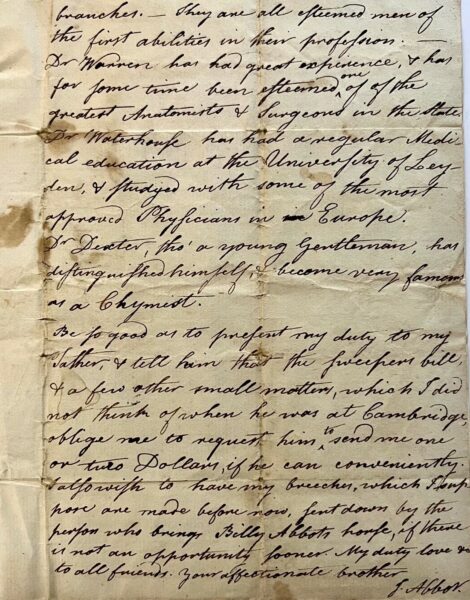I am curious to know of your Presbyterial Soc. this past year. If you have a report printed, please send me one, and when you see Mrs. Wylie, please give her my special love. Perhaps you would be willing to let her see this letter. We have had Dr. and Mrs. Arthur J. Brown with us in Syria one month, and they, though wearied by their long tour, around the world, were able to give much of enlivening, stimulating talks and wise counsels to us during their visits to the various stations. The Syrians were delighted with Dr. Brown’s addresses, and he always had a word in season for every occasion – He left us yesterday – Syria being the last of his mission fields to be visited only the home welcomes are now to be anticipated. He goes directly to the General Assembly to make the annual address on Foreign Missions there.
Next year perhaps you would be willing to ask whether some of the ladies could obtain medical papers or magazines to mail to me. I am anxious to supply not only the Editor of the Arabic Medical Journal ‘El Jahib’ but also the library table of the Syrian Protestant College. The only address needful is Dr. M. Eddy – c/o French Post Office, Beyrout or Beirut Syria – We need papers and magazines of all kinds but medical journals especially. My brother Will sends to you both his most cordial and affectionate greetings in which I would join. If you have a report of the church for the past year please send us one. My warm love to any who may enquire after me in the Pres. Society when you next meet…”
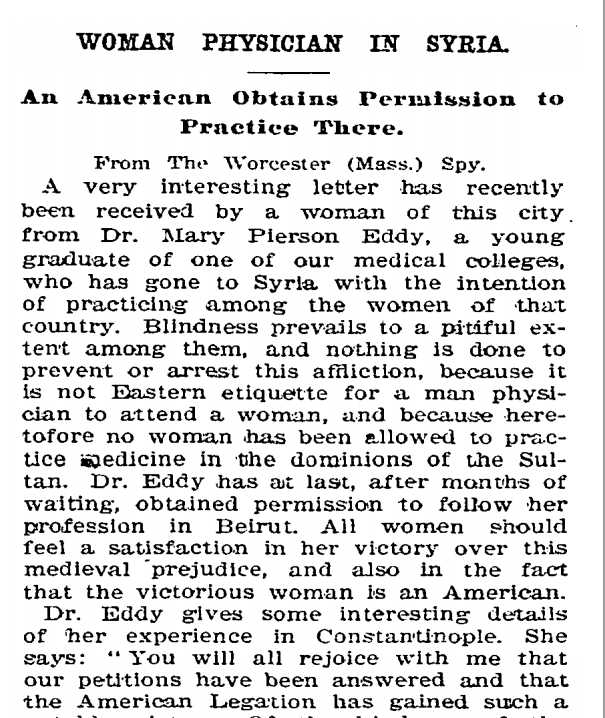 Eddy was born and raised in Syria, then part of the Ottoman Empire, to missionary parents from New York state. Only returning to the United States for her education, she earned a medical degree from Woman’s Medical College of Pennsylvania in Philadelphia in 1892, after which the Presbyterian Board of Foreign Missions sent her back to Syria, where she provided itinerant medical care in Lebanon’s Keserwan district, traversing the countryside on horseback, performing surgeries in tents and staying in crowded mud huts. The following year, she traveled to Istanbul to obtain a medical license from Ottoman officials, impressing them by speaking flawless Arabic and stating, “I am of you and from among you,” before undergoing six hours of questioning of her medical knowledge. An 1894 report in The New York Times discussed Eddy’s motivation: “Blindness prevails to a pitiful extent among [Syrian women], and nothing is done to prevent or arrest this affliction, because it is not Eastern etiquette for a man physician to attend a woman, and because heretofore no woman has been allowed to practice medicine in the dominions of the Sultan,” (“Woman Physician in Syria,” New York Times, 1894). Returning to Syria, she established hospitals and clinics including “a dispensary for women in the area of Junieh [sic], 15 miles north of Beirut, where the Maronite Christians had prevented any Protestants from living. By her service, Eddy soon made friends and opposition faded,” (Biographical Dictionary of Christian Missions, ed. Anderson). In 1903, Eddy founded a tuberculosis sanatorium that in the summer brought patients from Jounieh to the cool mountains near Hamana, and then back to the seaside during winter.
Eddy was born and raised in Syria, then part of the Ottoman Empire, to missionary parents from New York state. Only returning to the United States for her education, she earned a medical degree from Woman’s Medical College of Pennsylvania in Philadelphia in 1892, after which the Presbyterian Board of Foreign Missions sent her back to Syria, where she provided itinerant medical care in Lebanon’s Keserwan district, traversing the countryside on horseback, performing surgeries in tents and staying in crowded mud huts. The following year, she traveled to Istanbul to obtain a medical license from Ottoman officials, impressing them by speaking flawless Arabic and stating, “I am of you and from among you,” before undergoing six hours of questioning of her medical knowledge. An 1894 report in The New York Times discussed Eddy’s motivation: “Blindness prevails to a pitiful extent among [Syrian women], and nothing is done to prevent or arrest this affliction, because it is not Eastern etiquette for a man physician to attend a woman, and because heretofore no woman has been allowed to practice medicine in the dominions of the Sultan,” (“Woman Physician in Syria,” New York Times, 1894). Returning to Syria, she established hospitals and clinics including “a dispensary for women in the area of Junieh [sic], 15 miles north of Beirut, where the Maronite Christians had prevented any Protestants from living. By her service, Eddy soon made friends and opposition faded,” (Biographical Dictionary of Christian Missions, ed. Anderson). In 1903, Eddy founded a tuberculosis sanatorium that in the summer brought patients from Jounieh to the cool mountains near Hamana, and then back to the seaside during winter.
Our letter discusses missionary business, asks for medical journals to be sent to her, and mentions prominent American Presbyterian missionary Arthur Judson Brown (1856-1963) and his 1901-1902 world trip to Asian missions. A proponent of ecumenicalism, Brown wrote a seventeen-volume diary recording his time in Asia.
Eddy also mentions the Presbyterian Mission General Assembly and the Syrian Protestant College, now the American University of Beirut, established in 1866, whose curriculum included medical training. Her brother, William Eddy, continued their parents missionary work in Sidon, Beirut.
In very fine condition.

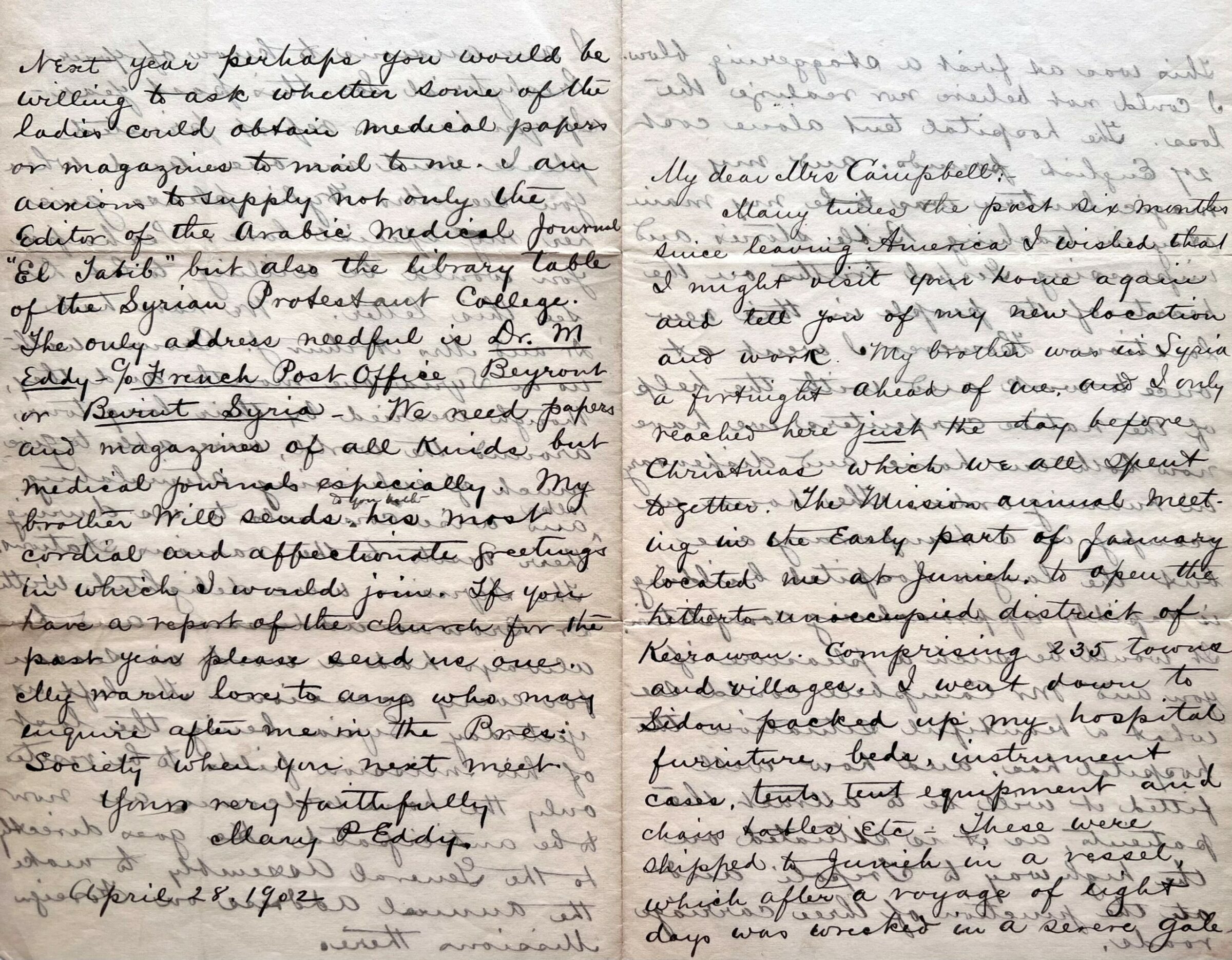
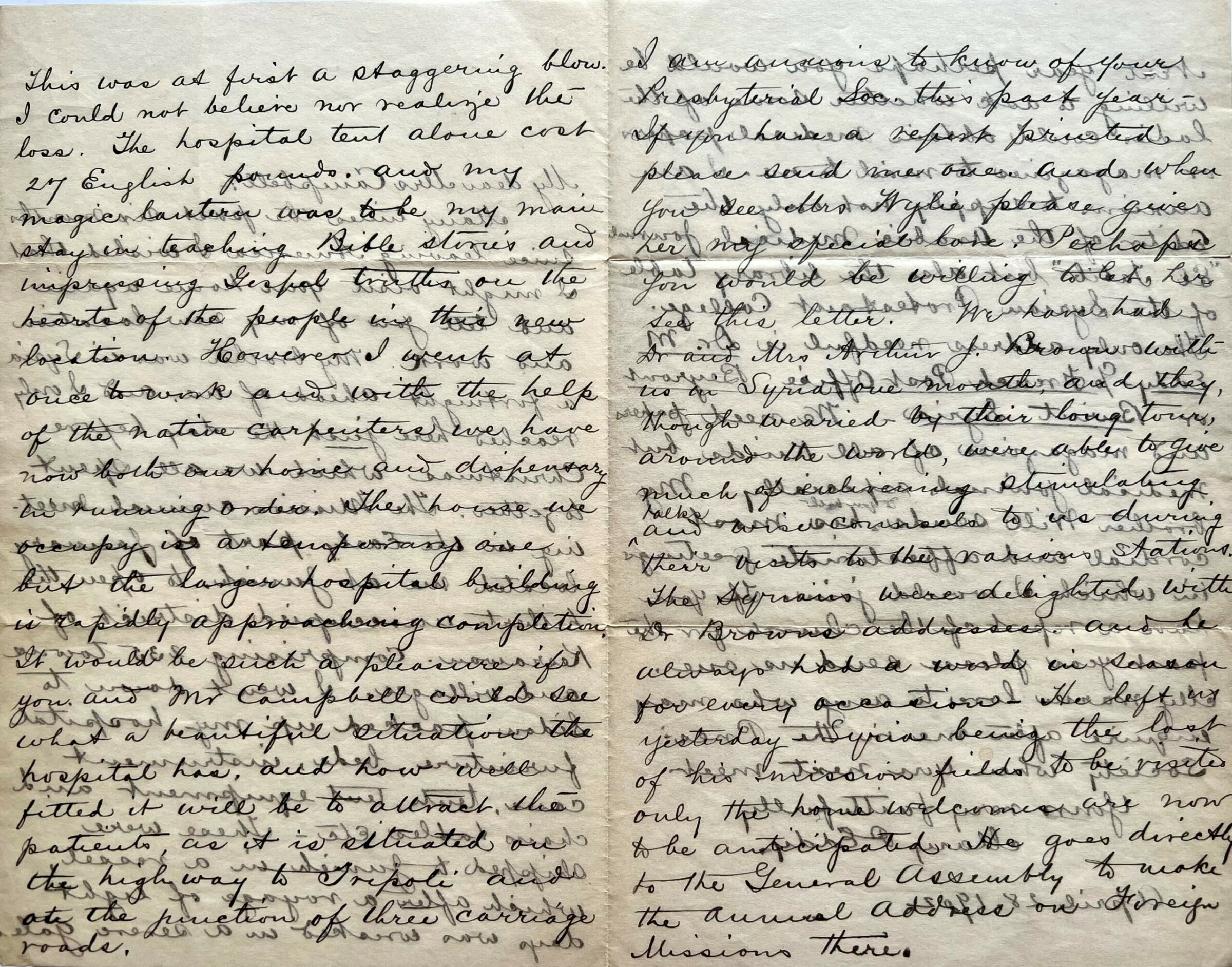
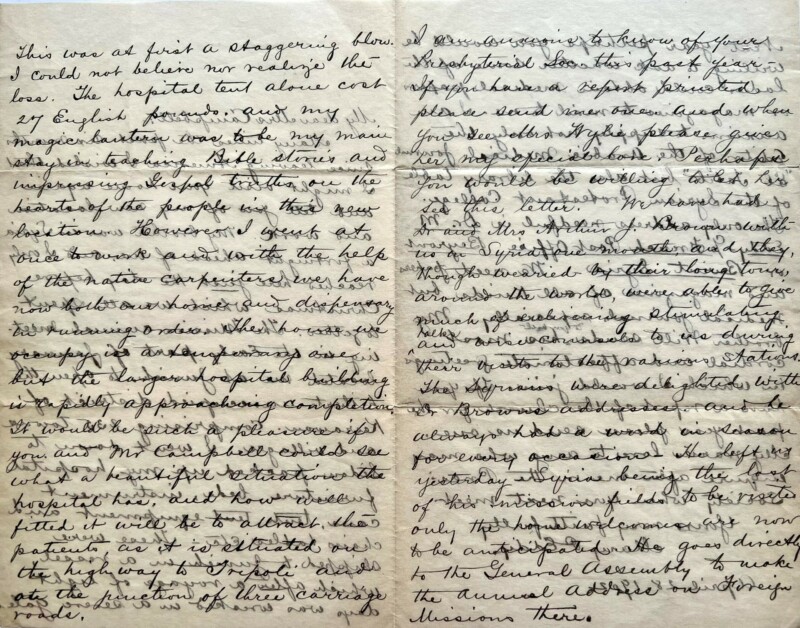
 Eddy was born and raised in Syria, then part of the Ottoman Empire, to missionary parents from New York state. Only returning to the United States for her education, she earned a medical degree from Woman’s Medical College of Pennsylvania in Philadelphia in 1892, after which the Presbyterian Board of Foreign Missions sent her back to Syria, where she provided itinerant medical care in Lebanon’s Keserwan district, traversing the countryside on horseback, performing surgeries in tents and staying in crowded mud huts. The following year, she traveled to Istanbul to obtain a medical license from Ottoman officials, impressing them by speaking flawless Arabic and stating, “I am of you and from among you,” before undergoing six hours of questioning of her medical knowledge. An 1894 report in The New York Times discussed Eddy’s motivation: “Blindness prevails to a pitiful extent among [Syrian women], and nothing is done to prevent or arrest this affliction, because it is not Eastern etiquette for a man physician to attend a woman, and because heretofore no woman has been allowed to practice medicine in the dominions of the Sultan,” (“Woman Physician in Syria,” New York Times, 1894). Returning to Syria, she established hospitals and clinics including “a dispensary for women in the area of Junieh [sic], 15 miles north of Beirut, where the Maronite Christians had prevented any Protestants from living. By her service, Eddy soon made friends and opposition faded,” (Biographical Dictionary of Christian Missions, ed. Anderson). In 1903, Eddy founded a tuberculosis sanatorium that in the summer brought patients from Jounieh to the cool mountains near Hamana, and then back to the seaside during winter.
Eddy was born and raised in Syria, then part of the Ottoman Empire, to missionary parents from New York state. Only returning to the United States for her education, she earned a medical degree from Woman’s Medical College of Pennsylvania in Philadelphia in 1892, after which the Presbyterian Board of Foreign Missions sent her back to Syria, where she provided itinerant medical care in Lebanon’s Keserwan district, traversing the countryside on horseback, performing surgeries in tents and staying in crowded mud huts. The following year, she traveled to Istanbul to obtain a medical license from Ottoman officials, impressing them by speaking flawless Arabic and stating, “I am of you and from among you,” before undergoing six hours of questioning of her medical knowledge. An 1894 report in The New York Times discussed Eddy’s motivation: “Blindness prevails to a pitiful extent among [Syrian women], and nothing is done to prevent or arrest this affliction, because it is not Eastern etiquette for a man physician to attend a woman, and because heretofore no woman has been allowed to practice medicine in the dominions of the Sultan,” (“Woman Physician in Syria,” New York Times, 1894). Returning to Syria, she established hospitals and clinics including “a dispensary for women in the area of Junieh [sic], 15 miles north of Beirut, where the Maronite Christians had prevented any Protestants from living. By her service, Eddy soon made friends and opposition faded,” (Biographical Dictionary of Christian Missions, ed. Anderson). In 1903, Eddy founded a tuberculosis sanatorium that in the summer brought patients from Jounieh to the cool mountains near Hamana, and then back to the seaside during winter.